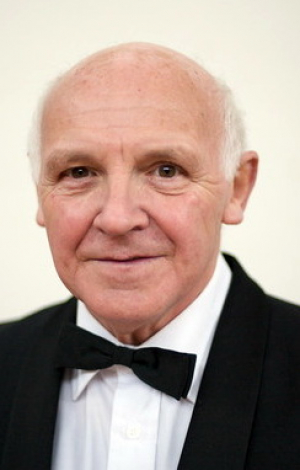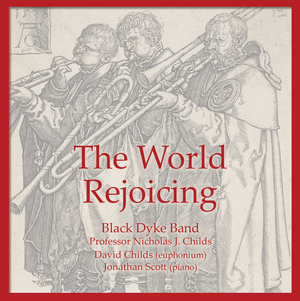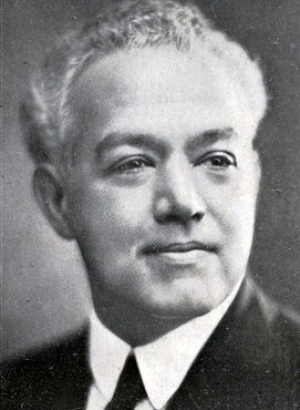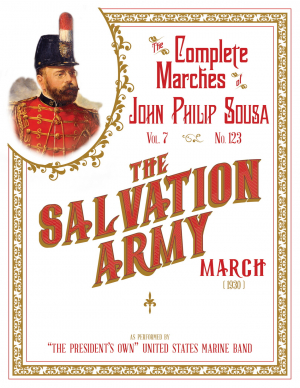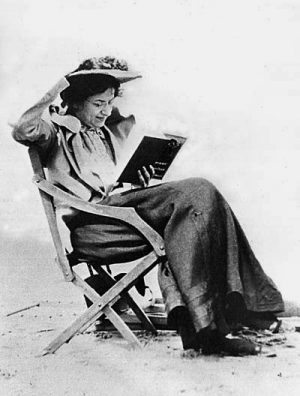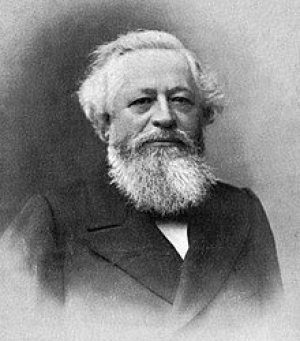
Talk Subjects
Chris Helme
On October 22, 2022, the legendary cornet player James Shepherd was presented with the Lifetime Achievement Award at the annual Brass Band England conference.
This show is a tribute to James and his life in brass bands at the highest level. Some of his solo performances are featured throughout the show. Along with some of his conducting performances and with the James Shepherd Versatile Brass (JSVB) - Enjoy the show.
The World Rejoicing - The Music of Edward Gregson Vol 7
Euphonium Soloist: David Childs
Pianist: Jonathan Scott
Black Dyke Band
MD: Professor Nicholas Childs
Doyen Recording DOY CD414
Moisés Simons (born Moisés Simón Rodríguez; 24 August 1889 in Havana, Cuba – 28 June 1945 in Madrid, Spain), was a leading Cuban composer, pianist, and orchestra leader. He was the composer of El Manisero (The Peanut Vendor in English) which is considered by many to be the most famous piece of music created by a Cuban musician and has since been recorded by other musicians from around the world hundreds of times.
The son of a Basque musician, he started studying music with his father, Leandro Simón Guergué. By the age of 9, he was the organist at his local church in the barrio of Jesús María and choirmaster of the Pilar church. At 15, he undertook advanced studies under various maestros in composition, harmony, counterpoint, fugue, and instrumentation.
The fame of El Manisero (The Peanut Vendor) led to Simons' own worldwide recognition. It sold over a million copies of sheet music for E.B. Marks Inc., and this netted $100,000 in royalties for Simons by 1943. Its success led to a 'rumba craze' in the US and Europe which lasted until the 1940s. The consequences of the Peanut Vendor's success was thus quite far-reaching.
For much of the 1930s, Simons lived and worked in France, mostly in Paris, and was still there when World War II broke out. He was finally able to return to Cuba in 1942. He then moved to the Spanish Canary Island of Tenerife and later to Madrid, Spain where he signed a contract to provide music for the film, Bambú, which included his last known composition, Hoy Como Ayer (Today Like Yesterday in English).
Moisés Simons died in Madrid, Spain, on 28 June 1945. He was 55.
On this week's show we are featuring The Peanut Vendor from the very latest CD produced by star trombone player from Black Dyke Band Brett Baker. On this CD Brett is accompanied by the JSVB (James Shepherd Versatile Brass) Legacy Ensemble conducted by David Thornton. For further information about Brett's new CD please check out this link https://www.brettbaker.co.uk/merchandise/cds/product=aspects-of-don-lusher-brett-baker-trombone-and-jsvb-tribute-band
Ivor Bosanko, the noted Salvation Army composer, his musical compositions have been for both vocal and brass groups. He was born in Cardiff, Wales, and attended the Royal Welsh College of Music. He was Bandmaster at Cardiff Canton Corps.
In 1975 he moved to the United States to become the Divisional Music Director in the Pendel Division of the Eastern Territory. He moved to California in 1979, becoming the Territorial Music Secretary for the Western Territory.
Ivor and his wife contributed much to young people at music camps and workshops. They were known for caring deeply about people’s spiritual lives, while using music as a means for spiritual health and growth. Ivor retired in 2001.
In this week’s show we are featuring the cornet solo The Heavenly Light by Ivor and played by the Canadian cornet player Robert Venables who is accompanied by the Canadian Staff with Bandmaster John Lam in 2014.
Eric Osterling (1926 - 2005) was born Connecticut, and began his musical career as a professional pianist at age 14, accompanying and arranging music for dance bands in the Hartford area. He continued his musical studies at the University of Connecticut, and the music college.
As the director of music at Portland Public Schools for 34 years, he was well known for his contributions as a music educator. His high school band was in constant demand at state, regional, and national levels, and was considered one of the finest bands in the East. Later, he moved to Florida Southern College, where he taught for six years.
As a composer and arranger, his background in music education made him aware of the needs of bands at all levels, and throughout his career he faithfully and continually provided them with challenging and satisfying works. His concert marches and arrangements are widely played by school, college and brass bands across the world.
Today we feature his march concert Totem Pole.played by the GUS (Footwear) Band conducted Stanley Boddington in 1975
THE SALVATION ARMY (1930)
Commander Evangeline Booth, daughter of William Booth, founder of the Salvation Army, asked Sousa to compose this march, and it was to her that he dedicated it. It received its premiere on May 16, 1930, at a pageant in New York celebrating the fiftieth anniversary of the Salvation Army in the United States. Sousa conducted the massed bands. In this march he had incorporated the Salvationists’ favourite hymn, “O Boundless Salvation,” and when these strains were played the surprised audience broke into enthusiastic applause.
This march is featured on today's show played by the Amsterdam Staff Band conducted by Howard Evans. The march written by Sousa has been arranged for brass bands by Ray Steadman-Allen.
Hedvig Antoinette Isabella Eleonore Jensen (December 4, 1867 – July 19, 1889), better known by her stage name Elvira Madigan, was a circus performer who performed as a slack rope dancer, artistic rider, juggler, and dancer. She is best known today for her romantic relationship with the Swedish nobleman and cavalry officer Sixten Sparre. Their joint death caused great sensation and the event was described in song by, among others, the author Johan Lindström Saxon in a song beginning "Sad things happen", which gained great popularity
In 1967, Bo Widerberg made his film adaptation, Elvira Madigan, with Pia Degermark and Thommy Berggren in the lead roles. The film music used throughout was the second movement from Mozart's Piano Concerto No. 21 in C major (K. 467), which has subsequently sometimes been referred to as the "Elvira Madigan" concerto. The same year, Poul Erik Møller Pedersen also directed a Danish film, with Anne Mette Michaelsen in the title role as Elvira Madigan.
The brass band arrangement of the Elvira Madigan theme is by Goff Richards and is on this week’s show.
Our featured photograph is of Eleanor Farjeon (13 February 1881 – 5 June 1965) was an English author of children's stories and plays, poetry, biography, history, and satire. Several of her works had illustrations by Edward Ardizzone. Some of her correspondence has also been published.
She won many literary awards and the Eleanor Farjeon Award for children's literature is presented annually in her memory by the Children's Book Circle, a society of publishers. She was the sister of thriller writer Joseph Jefferson Farjeon.
Her most widely published work is the hymn "Morning has Broken", written in 1931 to an old Gaelic tune associated with the Scottish village Bunessan, which in 1971 became an international hit when performed by Cat Stevens, reaching number six on the U.S. Billboard Hot 100, number one on the U.S. easy listening chart in 1972, and number four on the Canadian RPM magazine charts.
'Morning has Broken' is featured on this week's show.
Félix-Alexandre Guilmant b: 12 March 1837 – d: 29 March 1911 was a French organist and composer . He was the organist of La Trinity from 1871 until 1901. A noted teacher, performer, and improviser, Guilmant helped found the Schola Cantorum de Paris . He was appointed as Professor of Organ at the Paris Conservatoire in 1896.
He was an accomplished and extremely prolific composer and devoted himself almost entirely to works for his own instrument, the organ.
Though few in number, his works for instruments besides the organ have not been entirely neglected. For example, the Morceau Symphonique (Concert piece for Trombone) is one of the most frequently performed trombone solos, enjoying longstanding popularity among both professional and advanced student trombonists.
We are featuring this piece arranged by Ray Steadman-Allan on this week’s show.
'Anonymous Romance' is a work for guitar, also known as "Spanish Romance", "Romance de Espana", "Romance de Amor", "Romance of the Guitar", "Romanza" and "Romance d'Amour" among other names.
Origins and authorship remain in doubt. It is suspected originally of being a solo guitar work from the 19th century.
It has been attributed to at least nine composers. The question of authorship has probably been propagated by three main reasons: unclaimed by its true author, possibly to avoid paying copyright fees, and the desire of publishing companies to claim the valuable copyright of this world-famous piece.
The style of the piece is parlour music of the late 19th century in Spain or South America.
The earliest recording of "Romance" is on a cylinder featuring two guitarists and dated sometime between 1897 and 1901.
The brass band arrangement is by the late Darrol Barry (our featured photograph) and is just one from the legacy of music he left us all to enjoy and it is on the show today.
Talks Available
All the presentations are timed to last up to an hour except where shown - questions are gladly taken after the presentation. All have been presented to male, female and mixed audiences of varying age groups.
-
A Postcard from the Past
The Sunny Vale Pleasure Gardens, Halifax - Yorkshire’s Alton Towers of the…
-
All in a Days Work
Reminiscences from 30 years in the Police Service – (humorous lecture presentation)…
-
Legends from the world of Brass Bands
(Info-tainment – digital slides & music) – 1 hour presentation.
-
A Week in May
A story based on the Murder of Lord Frederick Cavendish (of the…
- Memories of Christmas Past
-
The Road to Publication
In 1979 I was asked to assist in presenting a series of…
-
How we used to live
We have all seen and experienced changes in our lives. Bring back…
- Holiday Memories from the Past
-
Other Folks Rubbish (Not suited to a Zoom presentation)
With a local history theme… – (thought provoking humorous lecture presentation) –…
- So you want to be a Pirate ? - The life of a Pirate was not all that it seemed
- Superstitions, New Year Resolutions and the Origins of St Valentine's Day
- Brighouse at Work
-
Sorry but I am not able to accept any more face to face talk bookings at the present time ONLY ZOOM TALKS


